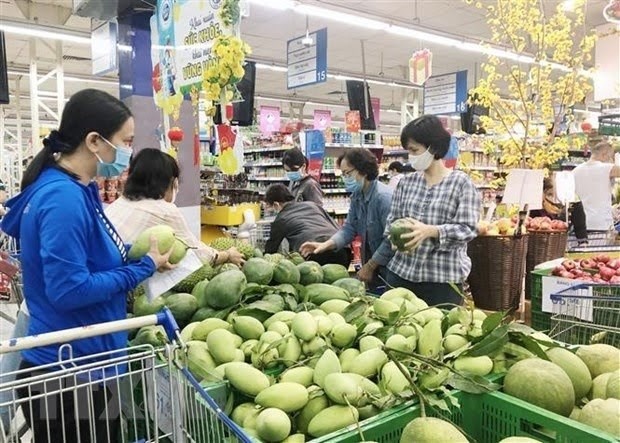Vietnam faces risk of pressure on imported inflation
 |
| Illustrative image (Source: VNA) |
The energy crisis pushed up fuel prices on the globe, along with the increase in food and commodity prices at the end of the year, causing inflation in developed countries to rise to a record high. Besides this, the largest import market of Vietnam, China, reports 26-year high inflation as the power crunch bites.
The situation caused pressure on Vietnam’s inflation outlook for 2022 as the country remains economically open and its total import-export turnover per GDP stands at 200 per cent, according to the General Statistcs Office (GSO). Besides this, domestic production, consumption, and prices are strongly influenced by the aggregate demand of the world economy and fluctuations in raw material, fuel prices, and exchange rates, thus these factors raise the risk of imported inflation.
Nguyen Bich Lam, former director-general of the GSO, said that domestic production depends on imported materials. Thus, the fluctuating raw material prices on the global market strongly impact on the cost of domestic products and the inflation of the Vietnamese economy.”
Statistics published by the GSO show that the cost for imported materials makes up 37 per cent of the total cost for materials of the whole country. In the processing and manufacturing sector – which is considered the motivation for the economy’s growth, the proportion accounts for nearly 51 per cent.
The statistics also show that, in the first 10 months of 2021, the index of animal feed and raw materials hiked by 20.99 per cent on-year.
“The cost increase of materials dictates the prices of finished products and domestic services. In Vietnam, an adjustment of 1 per cent in materials will raise the selling prices of finished products by 2.06 per cent, pulling inflation up,” Lam said.
The recovery of domestic consumption is considered a risk of inflation. COVID-19 led to slowed down consumption with halted operations for several months, and demand for goods is expected to remain weak.
However, HSBC Global Research forecast a gradual recovery in domestic demand that might offset higher energy prices, and therefore, inflation is expected to rise to 3.5 per cent for 2022, which remains below government thresholds. According to the latest data of the GSO, despite the increase in gasoline prices and consumption, the consumer price index (CPI) in November increased by 0.32 per cent, compared to the previous month. On average over the past 11 months, the CPI only increased by 1.84 per cent, the lowest in the past five years.
It is expected that the inflation rate in Vietnam this year will be under 3 per cent.
What the stars mean:
★ Poor ★ ★ Promising ★★★ Good ★★★★ Very good ★★★★★ Exceptional
Related Contents
Latest News
More News
- Congratulations from VFF Central Committee's int’l partners to 14th National Party Congress (January 25, 2026 | 09:46)
- List of newly-elected members of 14th Political Bureau announced (January 23, 2026 | 16:27)
- 14th Party Central Committee unanimously elects To Lam as General Secretary (January 23, 2026 | 16:22)
- List of members of 14th Party Central Committee announced (January 23, 2026 | 09:12)
- Highlights of fourth working day of 14th National Party Congress (January 23, 2026 | 09:06)
- Press provides timely, accurate coverage of 14th National Party Congress (January 22, 2026 | 09:49)
- Press release on second working day of 14th National Party Congress (January 22, 2026 | 09:19)
- Minister sets out key directions to promote intrinsic strength of Vietnamese culture (January 22, 2026 | 09:16)
- 14th National Party Congress: Renewed momentum for OVs to contribute to homeland (January 21, 2026 | 09:49)
- Party Congress building momentum for a new era of national growth (January 20, 2026 | 15:00)

 Tag:
Tag:



















 Mobile Version
Mobile Version